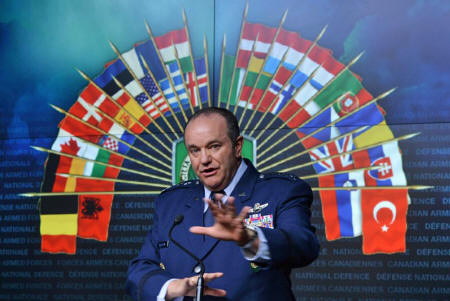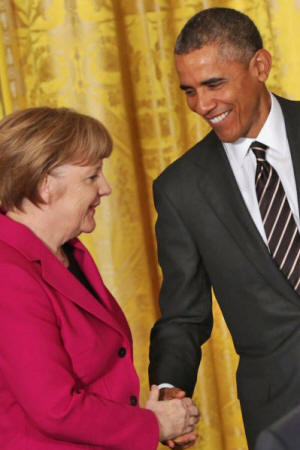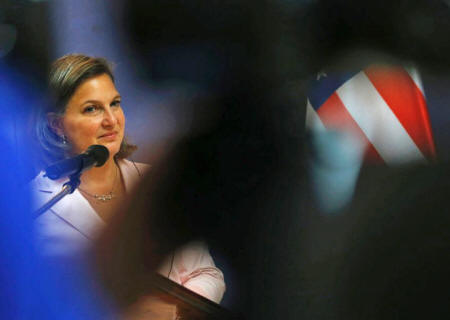|
|
|
has raised hackles in Germany with his public statements
about the
Ukraine crisis. AP
US President Obama supports Chancellor
Merkel's efforts at finding a diplomatic solution to the Ukraine
crisis. But hawks in Washington seem determined to torpedo Berlin's
approach. And NATO's top commander in Europe hasn't been helping
either.
The Minsk cease-fire wasn't holding
perfectly, but it was holding.
Putin, the 59-year-old said, had once again,
German leaders in Berlin were stunned.
They didn't understand what Breedlove was talking about. And it wasn't the first time.
Once again, the
German government, supported by intelligence gathered by the Bundesnachrichtendienst (BND), Germany's foreign intelligence
agency, did not share the view of NATO's Supreme Allied Commander
Europe (SACEUR).
For months, Breedlove has been commenting on Russian activities in eastern Ukraine, speaking of troop advances on the border, the amassing of munitions and alleged columns of Russian tanks.
Over and over again, Breedlove's numbers
have been significantly higher than those in the possession of
America's NATO allies in Europe. As such, he is playing directly into the
hands of the hardliners in the US Congress and in NATO.
Foreign Minister Frank-Walter
Steinmeier even found it necessary recently to bring up
Breedlove's comments with NATO General Secretary Jens Stoltenberg.
Europeans have also begun to see others as hindrances in their search for a diplomatic solution to the Ukraine conflict.
First and foremost among them is Victoria
Nuland, head of European affairs at the US State Department. She
and others would like to see Washington deliver arms to Ukraine and
are supported by Congressional Republicans as well as many powerful
Democrats.
Sources in Washington say that Breedlove's bellicose comments are first cleared with the White House and the Pentagon.
The general, they say, has the role of the
"super hawk," whose role is that of increasing the pressure on
America's more reserved trans-Atlantic partners.
after a Feb. 9 meeting in Washington:
Increasing pressure
on America's more reserved trans-Atlantic partners.
But for months now, many in the Chancellery simply shake their heads each time NATO, under Breedlove's leadership, goes public with striking announcements about Russian troop or tank movements. To be sure, neither Berlin's Russia experts nor BND intelligence analysts doubt that Moscow is supporting the pro-Russian separatists.
The BND even has proof of such support.
Just over three weeks ago, during the
cease-fire talks in Minsk, the Ukrainian military warned that the
Russians - even as the diplomatic marathon was ongoing - had moved
50 tanks and dozens of rockets across the border into Luhansk. Just
one day earlier, US Lieutenant General Ben Hodges had
announced "direct Russian military intervention."
Even those American intelligence officials who supply the BND with daily situation reports were much more reserved about the incident than Hodges was in his public statements.
One intelligence agent says it "remains
a riddle until today" how the general reached his conclusions.
At the beginning of the crisis, General Breedlove announced that the Russians had assembled 40,000 troops on the Ukrainian border and warned that an invasion could take place at any moment.
The situation, he said, was "incredibly concerning."
But intelligence officials from NATO
member states had already excluded the possibility of a Russian
invasion. They believed that neither the composition nor the
equipment of the troops was consistent with an imminent invasion.
Furthermore, most of the military
equipment had not been brought to the border for a possible
invasion, but had already been there prior to the beginning of the
conflict. Furthermore, there was no evidence of logistical
preparation for an invasion, such as a field headquarters.
On Nov. 18, 2014, he told the German newspaper Frankfurter Allgemeine Zeitung that there were,
One day later, he told the website of
the German newsmagazine Stern that they weren't fighting units, but
"mostly trainers and advisors."
The alliance relies on intelligence
gathered by agents from the US, Britain, Germany and other member
states. As such, SACEUR has a wide range of information to choose
from.
It was, he noted,
But the OSCE had only observed military convoys within eastern Ukraine.
OSCE observers had said nothing about
troops marching in from Russia.
He wrote that it was to be expected that assessments of NATO's intelligence center, which receives information from all 33 alliance members in addition to partner states, doesn't always match assessments made by individual nations.
He says that NATO's strategy is to,
He also wrote that: "
The German government, meanwhile, is doing what it can to influence Breedlove.
Sources in Berlin say that conversations to this end have taken place in recent weeks. But there are many at NATO headquarters in Brussels who are likewise concerned about Breedlove's statements.
On Tuesday of last week, Breedlove's public
appearances were an official item on the agenda of the North
Atlantic Council's weekly lunch meeting. Several ambassadors present criticized
Breedlove and expressed their incredulity at some of the commander's
statements.
The West can't counter Russian propaganda with its own propaganda,
Berlin sources also say that it has become conspicuous that Breedlove's controversial statements are often made just as a step forward has been made in the difficult negotiations aimed at a political resolution.
Berlin sources say that Germany should
be able to depend on its allies to support its efforts at peace.
Niels Annen, who has long specialized in foreign policy, has also been frequently dissatisfied with the information provided by NATO headquarters.
The pressure on Obama from the Republicans, but also from his own political camp, is intense.
Should the ceasefire in eastern Ukraine not hold, it will likely be difficult to continue refusing Kiev's requests for shipments of so-called "defensive weapons." And that would represent a dramatic escalation of the crisis.
Moscow has already begun issuing threats in anticipation of such deliveries.
Although President Obama has decided for the time being to give European diplomacy a chance, hawks like Breedlove or Victoria Nuland are doing what they can to pave the way for weapons deliveries.
US diplomat Victoria Nuland:
Paving the way for
weapons deliveries.
In reporting on the meeting later, the German tabloid Bild reported that Nuland referred to the chancellor's early February trip to Moscow for talks with Putin as "Merkel's Moscow stuff."
No wonder, then, that people in Berlin have the impression that important power brokers in Washington are working against the Europeans.
Berlin officials have noticed that, following the visit of American politicians or military leaders in Kiev, Ukrainian officials are much more bellicose and optimistic about the Ukrainian military's ability to win the conflict on the battlefield.
She has never sought to hide her
emotional bond to Russia, even saying "I love Russia." Her
grandparents immigrated to the US from Bessarabia, which belonged to
the Russian empire at the time. Nuland speaks Russian fluently.
Mykola Asarov, who was prime minister under toppled Ukrainian President Viktor Yanukovych, recalls that Nuland basically blackmailed Yanukovych in order to prevent greater bloodshed in Kiev during the Maidan protests.
She also, he said, threatened tough economic and political sanctions against both Ukraine and the country's leaders.
According to Asarov, Nuland said that,
were violence used against the protesters on Maidan Square,
information about the money he and his cronies had taken out of the
country would be made public.
Her husband, the neo-conservative Robert Kagan, is, after all, the originator of the idea that Americans
are from 'Mars' and Europeans, unwilling as they are to realize that
true security depends on military power, are from 'Venus'...
On the first day of the Munich Security
Conference, the two gathered the US delegation behind closed doors
to discuss their strategy for breaking Europe's resistance to arming
Ukraine.
In Berlin, top politicians have always considered a common position vis-a-vis Russia as a necessary prerequisite for success in peace efforts.
For the time being, that common front is still holding, but the dispute is a fundamental one - and hinges on the question of whether diplomacy can be successful without the threat of military action.
Additionally, the trans-Atlantic partners also have differing goals. Whereas the aim of the Franco-German initiative is to stabilize the situation in Ukraine, it is Russia that concerns hawks within the US administration. They want to drive back Moscow's influence in the region and destabilize Putin's power.
For them, the
dream outcome would be regime change in Moscow.
Yavoriv is also the site where US soldiers want to train members of the Ukrainian National Guard for their future battle against the separatists.
According to
the Pentagon's plans, American officers would train the Ukrainians
on how to use American artillery-locating radar devices. At least
that's what US Army in Europe commander Lt. Gen. Hodges announced in
January.
On Tuesday, Hodges said during an appearance in Berlin that he expects the training will still begin at some point this month.
|




